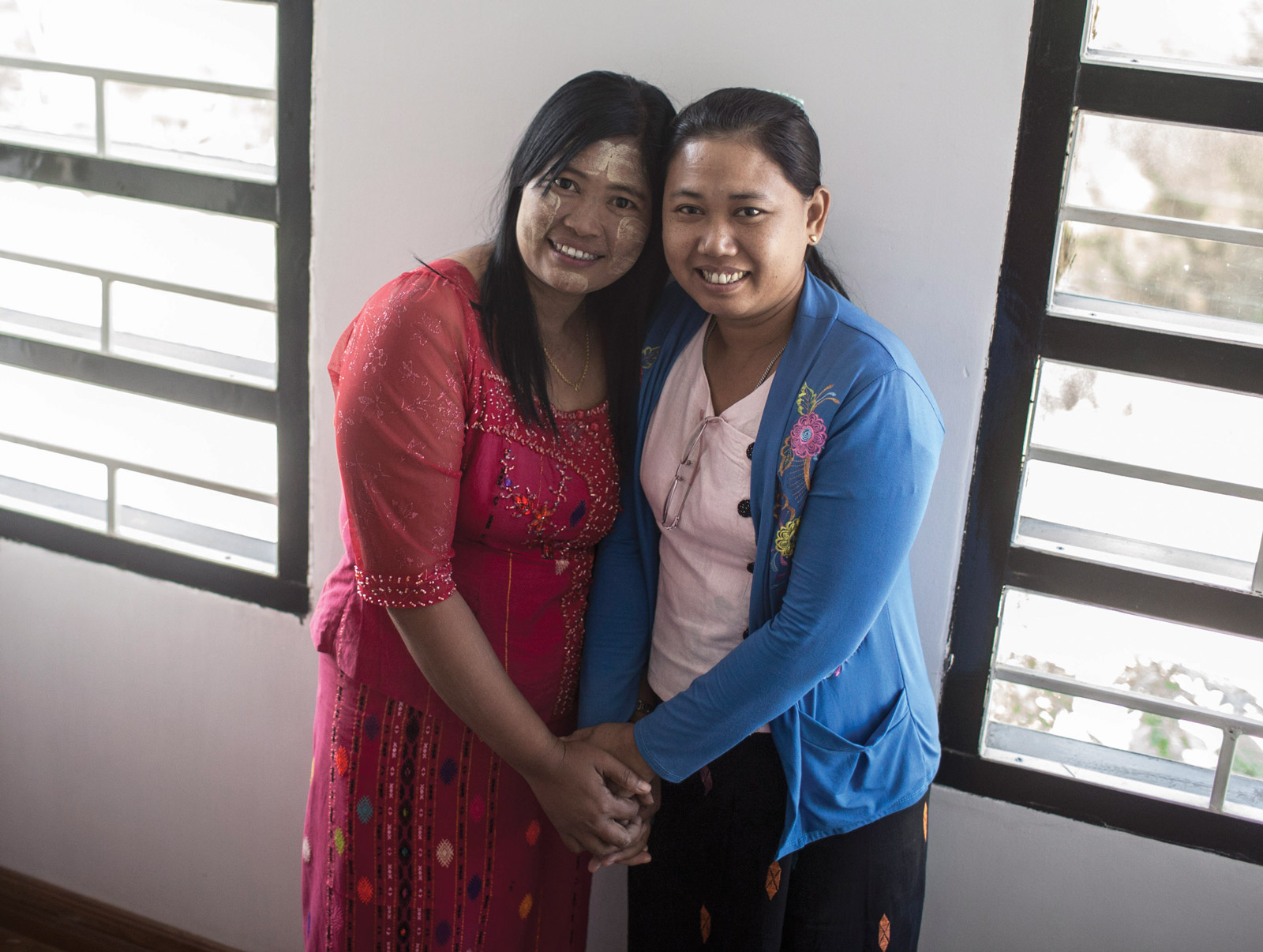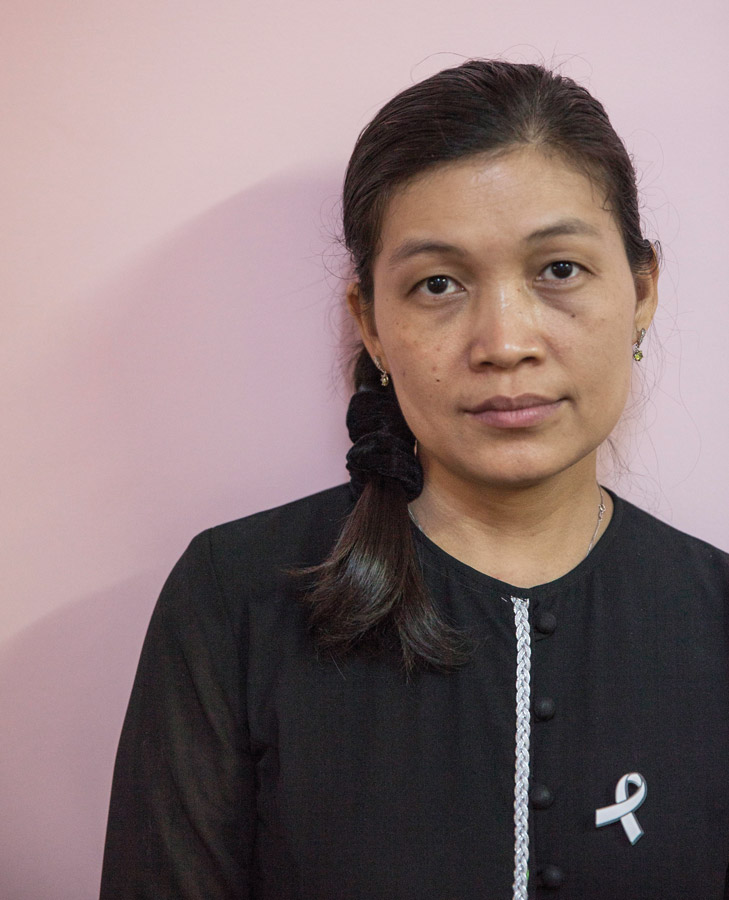Hanging out the washing in Myanmar requires careful navigation of major cultural taboos. A woman’s longyi, or traditional wraparound skirt, cannot be hung above a man’s, and nor can her underwear. This puzzling domestic decree is all about protecting a man’s hpoun, or masculine ‘power’.
“As you are a man, you have that invisible superpower by birth. But as a woman you don’t have it. You are born as a lower hpoun person, simply because of your gender,” explains women’s rights activist May Sabe Phyu. “Womenswear – this being the sarong or underwear – is not supposed to be washed together with men’s clothes, because if the man’s clothes touch a woman’s underwear or clothes it will reduce their hpoun. It’s a very silly idea. It’s simply not acknowledging that men are also born from the woman.”
The practice is widespread in Myanmar, encompassing all strata of society and spanning religious beliefs, according to Htar Htar, founder of the local NGO Akhaya Women. And not only must women’s garments be kept separate from men’s, they cannot be hung to dry in public areas.
“This is even among the educated. Even those who’ve been educated abroad, Master’s and PhD – they come here, they practise this. They practise this. Across religions. This is not about Buddhism, but this is culturally very heavily related, ingrained. So we have the Christians, Muslims, practise the same thing,” Htar says.
“It is really rooted in [the idea that] menstrual blood is dirty and rotten. So when a man is sitting like this,” Htar adds, demonstrating a seated position with her legs stretched out in front, “women cannot, and even girls cannot, pass over his legs because they are dirty. All the time there are messages around that women are low, women are dirty, women are not good.”
Beyond simply creating more work for those charged with doing the laundry, the activists agree that the practice has wider implications for the way men and women interact outside the home, reinforcing gender inequality by categorising women as second-class citizens.

Sabe Phyu says that many people – both men and women – fail to recognise that gender inequality persists in Myanmar and is closely tied to such societal norms. As the director of the Gender Equality Network, which counts more than 120 organisations as members, she says she often encounters surprise or dismissive reactions when advocating for women’s rights.
Closely connected with the cultural politics surrounding clothes washing is the ignominy that shrouds the female anatomy. It is telling that there is no word for vagina in Burmese, the country’s lingua franca. The only polite way to refer to the female sex organ translates to the rather euphemistic phrase ‘woman’s body’.
This linguistic oversight is illustrative of the cultural obstacles faced by Htar and her organisation as they lead the drive to get women in deeply conservative Myanmar talking about – and gaining a deeper understanding of – their own sexuality through pioneering sex education classes.
One of the first activities on the agenda is for participants to pick up a pencil and draw a vagina.
“No one starts; [no one] dares to draw,” recounts Htar of a typical class. “Sometimes they are really funny drawings – they never [did it before]. So, with Myanmar women, talking about the vagina and these things are really helpful practices.
“When you deliver [a baby] in a normal delivery with a doctor at a hospital, a private hospital, they cut the vagina instead of waiting until it’s open. So almost every normal delivery has this cut. They don’t know what is vagina, even doctors, they don’t know what is vagina,” she adds.
Although the programme initially drew criticism for its contextually revolutionary content, Htar says that, to date, nearly 2,500 individuals have attended the two-day workshops, including Buddhist nuns, police officers and some men.
“Sexuality is amazing in Myanmar. We’re so popular because we talk about this topic… Actually we’re not doing any sophisticated training, it’s basic sex education and [explaining] rooted causes [of gender discrimination], pointing out [issues such as] the virgin concept,” she says in reference to the societal value placed on virginity.
A lack of sex education can have serious consequences in a country where sexual violence is a major concern. According to Myanmar Now, an independent news website, national police records show that 700 rape cases are reported in the country each year, but many more go unreported amid a culture of silence and victim blaming. Publicising a rape by taking the matter to court is viewed as ‘turning one shame into two’.
Zin Min Thu, a workshop leader at Akhaya Women, says that participants are usually extremely reluctant to discuss their anatomy or sex lives at the start of the two-day session. While men are apparently comfortable conversing about sex with their peers, it is still seen as unacceptable for women to do so – even with their female friends.
By the end, however, the women are having frank discussions about topics canvassed during the classes, such as orgasms – a concept that was previously a complete unknown for most – and how to approach delicate conversations with their husbands about the fact that they, too, would like to reach climax during sex.
“Women from other countries might think that this is very simple, and this is usual, but for us this is unusual. This is very unusual. The women never talk about orgasming or having sex with their husbands; they never discuss within their family or within their friends, so this is a very big achievement for us within this training,” Min Thu says.
The programme, Htar is keen to stress, is not simply focused on sexuality but aims to give women the means to confidently question entrenched cultural and societal norms that augment gender inequality and sexual violence. It includes serious discussions of women’s roles in society, sexual violence against women and children, and the need for women at the decision-making level in public life.
“This curriculum is based on learning about our own bodies and women feeling empowered, and from there we started to question and discover and talk about these ‘normal’ practices – daily practices – that influence us and reinforce us into being second citizens, as well as gender inequality issues,” says Htar.
A simple, but key, theme that runs throughout the programme is that, contrary to common beliefs, menstrual blood is not dirty. “This concept is very rooted in our lives, and also every woman has this attitude. And they tell themselves that they are inferior to men, and it’s because of this concept,” says Min Thu. “So we are talking about menstrual blood, that this blood is very clean, and this blood is very neutral, and this blood can make a baby and this is the power of the uterus.”
Ngnu Khine, 42, a mother of four who has completed the workshop, says the experience was eye-opening. “Before the training, I didn’t even know the nature of men and women and how to teach my sons to treat their partners,” she says. “I learned about the process of genitals – that women have their own. I didn’t even know that I had my own,” she adds.

Perhaps even more importantly, she gained a more nuanced understanding of issues such as sexual harassment and rape. “I learned a lot about gender, how to protect myself, and everything about women.” She now actively works to pass on her newfound knowledge to other women in her village, and supports victims of rape by reminding them they are not to blame.
After the two-day workshop, women are introduced to the concept of non-violent communication. It may seem unconnected, but Htar says this is a crucial step in the process: after coming to the realisation that they had, for many years, erroneously believed their body’s natural processes to be unclean, and their female organs something to be ashamed of, many of the participants feel combative.
“They feel empowered, but at the same time they feel aggressive – they want to fight back. They say: ‘I’m going to talk to my husband and fight back.’ But I say: ‘Fighting back is not something that we [should do].’ We can do it, but we will fall. We will fall apart. Because this needs a societal change,” she says.
Yet it is clear that wholesale change is still some way off. Min Thu joined Akhaya’s staff three years ago and has been leading women’s empowerment workshops since October 2015. The 27-year-old is passionate about her role, saying that learning about her sexuality allowed her to find “the spice of life”. However, she has not yet worked up the nerve to tell her father exactly what it is that she does for a living.
“My family knows that Akhaya is working for women’s empowerment, but not exactly [what I do]. Especially my father does not know the details about this – he just knows that we are providing the sexuality health knowledge. But what he knows about sexuality health is not the real sexual knowledge,” she says. “I think if he was listening to what I’m talking about in the facilitation training he would be shocked.”


